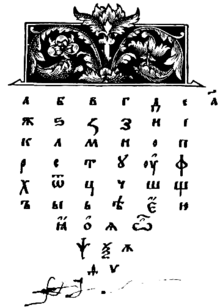Ot (Cyrillic)

Ot (Ѿ ѿ; italics: Ѿ ѿ) is a letter of the early Cyrillic alphabet. Though it originated as a ligature of the letters Omega (Ѡ ѡ) and Te (Т т), it functions as a discrete letter of the alphabet, placed between х and ц.[1] This can be seen in the first printed Cyrillic abecedarium (illustrated), and continues in modern usage.[2]
Ot is used in Church Slavonic to represent the preposition отъ 'from' and prefix отъ-. It does not stand for this sequence of letters in any other context, nor can the sequence отъ be substituted for it where it does occur. It is used with a similar purpose in mediaeval manuscripts of other Slavonic languages written with the Cyrillic alphabet. In printed books ѿ is often used in preference to (ѡ҃) for the numeral 800.
Computing codes
[edit]| Preview | Ѿ | ѿ | ||
|---|---|---|---|---|
| Unicode name | CYRILLIC CAPITAL LETTER OT | CYRILLIC SMALL LETTER OT | ||
| Encodings | decimal | hex | dec | hex |
| Unicode | 1150 | U+047E | 1151 | U+047F |
| UTF-8 | 209 190 | D1 BE | 209 191 | D1 BF |
| Numeric character reference | Ѿ |
Ѿ |
ѿ |
ѿ |
References
[edit]- ^ Note that Ivan Fedorov’s alphabet does not include ѡ (though it does include ѽ). This is because it does include ѻ, which was considered orthographically equivalent; one may compare the alphabet from Spiridon Sobol’s abecedarium of 1631, which has ѡ where Ivan Fedorov has ѻ.
- ^ Иеромонах Алипий, Грамматика церковно-славянского языка, Saint Petersburg, 1997, p. 17

